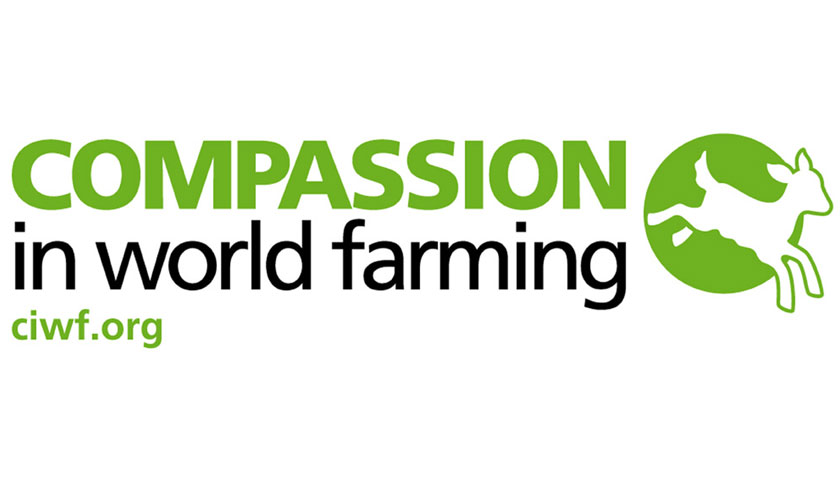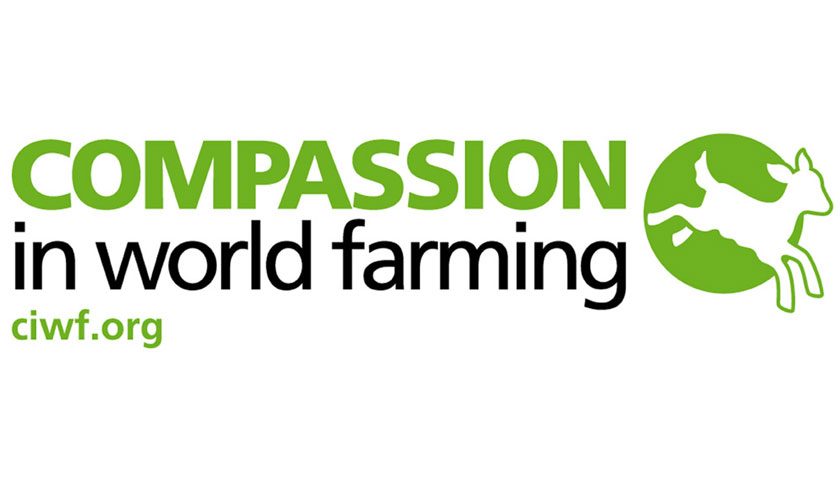Compassion in World Farming held its Good Farm Animal Welfare Awards (GFAWA) in Paris in October, recognising 49 winners from over 15 countries for their leadership in improving farm animal welfare and promoting more sustainable supply chains. Hosted by Deborah Meaden, Compassion’s Patron and sustainable business advocate, the event celebrated businesses whose commitments will positively benefit the lives of over 500 million animals annually.
Deborah commented: “It’s inspiring to see so many businesses around the world making significant strides in animal welfare and sustainability. These awards shine a light on the growing number of companies dedicated to making positive change, at such a crucial time for farmed animals and the environment. Compassion’s expert Food Business team is uniquely positioned to support companies in transforming the lives of millions of animals and building a food system that is fit for the future.”
A record number of awards were presented to companies leading the cage-free movement for hens, sows and rabbits, reinforcing Compassion’s mission to ‘End the Cage Age’. These leading companies are proving that cage-free production is not only viable and the right thing to do – but beneficial for their customers, their brand and for the animals in their supply chain.
The 2024 Awards celebrated cage-free pioneers not only in Europe, but also across Asia and Latin America—regions often seen as challenging markets, yet home to many of this year’s Good Egg Award winners—highlighting the growing global momentum for cage-free production.
The event also celebrated companies tackling the broader challenges of food production by advancing more sustainable practices, promoting healthier diets, and embracing nature-friendly farming.
In total, there were no less than 13 Good Egg Award* winners from all over the world recognised for their cage-free egg commitments, including two from the retail sector: Lidl (Spain & Poland).
Since 2019, 100% of the eggs sold at Lidl Spain, both fresh and ingredient, have been cage-free, solidifying the company’s position as a leader and pioneer in Spain’s retail sector. Lidl Poland is also making significant progress, with 58% of its shell eggs and 99% of eggs in its own-brand products now cage-free.
Antonio Prada, Quality and Sustainability Manager at Lidl Spain explains: “Continuously improving and taking responsibility for Animal Welfare is a central pillar of our sustainability strategy at Lidl. In 2018, we became the first retailer in Spain to commit to selling only fresh eggs from cage-free hens. Later in 2019, we extended our commitment to ensure that ingredient eggs in our products also come from cage-free hens. We are therefore particularly proud of this award, which recognises our commitment to animal welfare. This kind of recognition helps us to continue to achieve our sustainability goals and objectives and, in particular, to continue to maintain our leadership in our commitment to animal welfare.”
Around the world millions of rabbits farmed for meat endure cramped, barren cages with only wire flooring to sit on, severely compromising their health and welfare. The lack of enrichment deprives them of the opportunity to perform essential natural behaviours.
Les Mousquetaires, France’s third-largest retailer, is a long-time advocate against cages and this year was awarded a Good Rabbit Commendation. In 2021, the company was among ten signatories of a letter to the EU Commission supporting a cage ban, reaffirming their stance in 2023. This year, Les Mousquetaires strengthened its commitment by pledging that by 2029, all fresh own-brand meat sold in France will come from cage-free fattening rabbits raised in spacious pens with access to burrows, platforms, and gnawing materials.
Grégoire Bourdaud Chairman of the Quality and CSR Department Groupement les Mousquetaires /Intermarché Bourg la Reine said : “We firmly believe that respecting both animals and the people who care for them is a cornerstone of a responsible food supply. Our approach to animal welfare is built on the five fundamental freedoms defined by the World Organisation for Animal Health (OIE), which guide our commitment to ensuring the highest standards of care.”
Innovation is essential for driving and sustaining meaningful change in our food systems. Compassion believes pioneering businesses that embrace true innovation deserve recognition, which is the purpose of the panel-based Best Innovation Award. Two Special Recognition Awards in the Best Innovation category were presented to retailers Albert Heijn and Marks & Spencer.
Albert Heijn, the largest supermarket in the Netherlands, has established an innovative collaboration across its entire supply chain—including feed suppliers, farmers, processors, and retailers—to improve shrimp welfare. They have effectively eliminated the cruel practice of eyestalk ablation – used to increase egg production in breeding shrimp – reduced the stocking density and introduced electrical stunning before slaughter. Their partnership with the Shrimp Welfare Project has been instrumental in developing humane stunning solutions and setting industry standards.
Albert Heijn is the first retail chain in the Netherlands to ban eyestalk ablation in their shrimp supply chain, a policy already in effect for all fresh shrimp and will extend to frozen and processed shrimp by 2025 for which they received their Special Recognition Award.
The second Special Recognition Award for Innovation was awarded toBritish retailer Marks & Spencer. In partnership with their shrimp producers and supported by FAI Farms, M&S has developed a comprehensive protocol to monitor the health and welfare of shrimp throughout their supply chain. This initiative not only aims to enhance shrimp welfare but also supports scientific research to address knowledge gaps and drive progress. By successfully establishing a shrimp supply chain free from mutilations, they are directly improving welfare standards, and by providing farmers with training and tools, they are advancing all aspects of shrimp welfare across their entire life cycle.
M&S exclusively sources from producers who do not practice eyestalk ablation, making this a core requirement into their Select Farm standards. They have also defined new outcome measures and initiated electric stunning trials, rolling out new stunners and updated harvest protocols. As a result, approximately 300 million shrimp annually will benefit from these advancements.
A key mission of Compassion is to encourage society to rethink its dietary choices, aiming to reduce meat and dairy consumption while increasing plant-based foods for a healthier planet. Compassion’s Planet Friendly Award, recognises companies that commit to meaningful reduction targets in their animal-sourced protein, set at 10%, 15%, and 25% over five years.
Lidl GB received a Bronze level Planet Friendly Award for being the first UK retailer to launch an ambitious protein strategy to shift the proportion of protein sales to 25% plant-based by 2030, supporting a move towards meeting the EAT-Lancet Planetary Health Diet and leading the industry in sustainable food transitions.
Compassion’s Sustainable Food & Farming Awards are selected by a panel of experts andcelebrate both small producers and large food companies making strides in producing higher welfare meat, dairy and eggs, while protecting improving, regenerating and restoring wildlife and the environment.
This year’s Corporate Sustainable Food & Farming Award winner was UK retailer Waitrose.
Waitrose, a leader in animal welfare in the UK retail sector, is expanding its sustainability efforts by trialling nature-friendly, regenerative, and low-carbon farming at Leckford Estate, its 2,800-acre farm in Hampshire. One-third of the estate is dedicated solely to biodiversity, with the rest focusing on farming in harmony with nature.
Since 2019, Waitrose has been testing and implementing a range of regenerative farming practices and is now expanding this initiative to eight satellite farms as part of a broader effort to transition their entire UK supply chain to regenerative farming. This effort is further strengthened by Waitrose’s pledge to source UK meat, milk, eggs, fruit, and vegetables from farms using regenerative practices by 2035.
Since adopting regenerative practices at Leckford, Waitrose has reported significant environmental benefits, including increased biodiversity, improved soil health, reduced carbon emissions, and a decrease in the use of chemical inputs.
To share their insights and encourage the wider adoption of regenerative methods, Waitrose plans to transform Leckford Estate into a Regenerative Agriculture Centre of Excellence, offering education and inspiration for farmers looking to implement these sustainable practices on their own farms.
Andrew Hoad, Head of Leckford Estate said: “We need a resilient food system that is kinder to nature and recognises the incredible value of healthy soil. We think a regenerative approach has the potential to do this. We are excited to extend our work at Leckford by now working with other farmers in supporting transition to regenerative agriculture across our UK based farmers and growers.”
Dr Tracey Jones, Global Director for Food Business, Compassion in World Farming concluded: “The geographical diversity, range of species, and the vast number of animals set to benefit from this year’s award winners are truly remarkable. I extend my heartfelt congratulations to all the winners.
Our award winners have taken decisive action, demonstrating that successful business models can thrive while prioritising animal welfare. Cages are the very symbol of factory farming, and it’s inspiring to see so many companies dismantling that system and paving the way for a brighter future. To create a truly future-fit food system, we now need legislators to follow their exemplary lead.
While advancing animal welfare is important, it’s critical that we begin to transform our entire food system. Many of this year’s winners are leading the way towards farming in harmony with nature, reducing reliance on animal proteins, and driving innovation. They stand as shining examples, proving that real change is possible—not only for the welfare of millions of farm animals but also for the health of people and the planet.”

